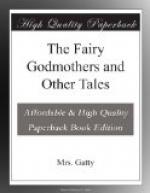Now then to our story.
At the end of ten years the Fairies agreed to go and have a peep how their charges were going on. They quite knew that nothing decisive could be found out, till the children had come to years of discretion and were their own mistresses. Still they thought it would amuse them just to go and see how the charms were working, as it were; so, away they went.
Now picture to yourselves a nice large nursery, much such a one as your own, in which several children are playing. The eldest, a girl of ten, you may see yonder lounging—gracefully perhaps—but still lounging in a rocking chair which she is swinging backwards and forwards, having set it in motion by the action of her foot on the floor. What a lovely face! I do not think you ever saw one so handsome except in a print in one of Mamma’s best picture books. All the features are perfectly good and in proportion, and the dark blue eyes are fringed by the longest eyelashes ever seen. The hair of this little girl too—look at it, as the soft chestnut ringlets wave about on her shoulders as she swings, and show the round richness of the curls.
Now if you ask about the expression on her face, I must tell you it was rather languid and “pensieroso.” Pensieroso is an Italian word really meaning thoughtful—but this little girl was not thinking, for then the expression of her face would have been much stronger and firmer and less languid; but the word has got to be used for a sort of awake-dreamy state when one lets thoughts float lazily along without having any energy to dwell upon them, and see whether they are good or bad.
The thought that was passing through this little girl’s head at the time I mention and which made her look so languid and pensieroso, was
“I wish it was 6 o’clock.”
Now here you are ready to laugh, I know, for there was nothing to look so languid about, in “I wish it was six o’clock!” but the fact was this: at half-past six the little girl’s Mamma was expecting a large party to dinner and the little girl was to dress at six and be ready to go down and see the company:—I might add and to be seen by them; for the little girl was, as you will have guessed, the beautiful Aurora herself, and there had been plenty of foolish people, though her good Mamma was not one of them, to tell her how pretty she was and how much people admired her.
It is a very pleasant thing to be admired, both for children and grown up people. “The love of approbation,” as it is called, i.e. the wish to be approved of and admired is a feeling which is very strong in most people; not in quite all, perhaps, but in most people certainly. But like all other powers of the mind considered apart from the influence of the heart and conscience, it is capable of being used to a very bad or a very good purpose. Thus you may remember what our Saviour says of the Pharisees who stood praying at the corners of the streets that they might be seen of men: Verily, they had their reward—viz: that men admired them: whereas those who do good deeds and pray privately, i.e. unseen and unadmired by men, should verily have their reward in that day when God who seeth in secret himself shall reward them openly.




